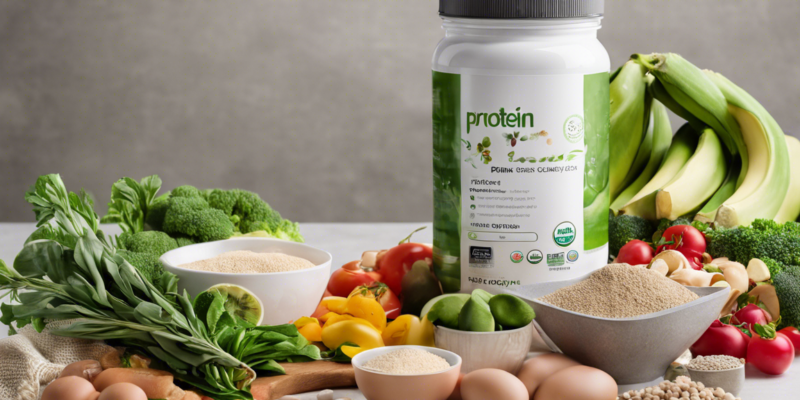Protein is an essential macronutrient that plays a crucial role in various bodily functions, such as building and repairing tissues, supporting immune function, and facilitating enzymatic reactions. As a key component of a healthy diet, protein is often associated with muscle building and weight management. However, its benefits go beyond just these aspects. In this article, we will delve into the power of protein and how it can positively impact your overall health and well-being.
Understanding Protein
Proteins are made up of amino acids, often described as the building blocks of the body. There are 20 different amino acids, nine of which are considered essential because the body cannot produce them on its own and they must be obtained through diet. Complete proteins contain all nine essential amino acids and are typically found in animal sources such as meat, poultry, fish, eggs, and dairy products. Incomplete proteins, on the other hand, lack one or more essential amino acids and are commonly found in plant sources like legumes, grains, nuts, and seeds.
Benefits of Protein
1. Muscle Growth and Repair
Protein is crucial for muscle growth and repair, making it essential for athletes, fitness enthusiasts, and individuals looking to maintain muscle mass, especially as they age.
2. Weight Management
Protein has a high satiety value, meaning it can help you feel full and satisfied, potentially reducing overall calorie intake and aiding in weight management.
3. Immune Function
Protein plays a vital role in supporting the immune system by aiding in the production of antibodies and other immune-boosting molecules.
4. Enzyme Function
Many enzymes responsible for catalyzing essential reactions in the body are made of proteins. Therefore, consuming adequate protein is necessary to ensure these processes run smoothly.
Protein Sources
While animal products are rich sources of protein, there are plenty of plant-based options as well. Incorporating a variety of protein sources into your diet ensures you get a wide range of amino acids and other essential nutrients. Some plant-based protein sources include:
- Quinoa
- Lentils
- Chickpeas
- Tofu
- Edamame
- Hemp Seeds
- Chia Seeds
- Almonds
Protein Quality
The quality of protein is determined by its amino acid profile and digestibility. High-quality proteins provide all essential amino acids in the right proportions and are easily digested and absorbed by the body. Animal proteins like meat, poultry, fish, and eggs are considered high-quality sources of protein. However, with careful planning, plant-based diets can also provide high-quality protein through combinations of different plant protein sources.
Protein Supplements
For individuals who have higher protein requirements due to intense physical activity, medical conditions, or specific dietary preferences, protein supplements can be a convenient way to meet their needs. Various types of protein supplements are available, including whey, casein, soy, pea, and rice protein powders. These supplements can be easily added to smoothies, oatmeal, or baked goods to boost protein intake.
Protein and Exercise
Protein plays a crucial role in exercise performance and recovery. Consuming protein either before or after a workout can help support muscle repair and growth. Aim to include a source of protein in your pre-workout and post-workout meals or snacks to optimize your exercise routine.
Protein Myths Debunked
Myth 1: Protein Causes Kidney Damage
While individuals with existing kidney conditions may need to monitor their protein intake, there is no evidence to suggest that protein causes kidney damage in healthy individuals.
Myth 2: You Can Only Get Protein from Animal Sources
Plant-based sources of protein can provide all the essential amino acids your body needs. By incorporating a variety of plant protein sources into your diet, you can easily meet your protein requirements.
Myth 3: Eating High-Protein Foods Will Make You Bulky
Consuming protein-rich foods, whether from animal or plant sources, is unlikely to cause excessive muscle gain unless paired with specific training protocols and caloric surplus.
Myth 4: Proteins and Carbohydrates Should Not Be Consumed Together
Combining proteins and carbohydrates in a meal can be beneficial, as it provides a balanced source of nutrients that can support energy levels and muscle recovery.
Frequently Asked Questions (FAQs)
1. How much protein do I need per day?
The recommended daily protein intake varies based on individual factors such as age, weight, activity level, and goals. As a general guideline, aim to consume 0.8-1 gram of protein per kilogram of body weight.
2. Is it possible to consume too much protein?
While excessive protein intake is generally not harmful for healthy individuals, very high levels of protein consumption over a prolonged period may have negative effects on kidney function and bone health.
3. Are plant-based proteins as effective as animal proteins?
Yes, plant-based proteins can be just as effective as animal proteins in meeting your nutritional needs. By combining different plant protein sources, you can ensure you get all the essential amino acids.
4. When is the best time to consume protein for muscle growth?
Consuming protein within 30 minutes to two hours after a workout can help support muscle repair and growth. However, spreading your protein intake throughout the day is also beneficial for overall muscle health.
5. Can I get enough protein on a vegan or vegetarian diet?
Yes, it is entirely possible to meet your protein requirements on a vegan or vegetarian diet by incorporating a variety of plant protein sources such as legumes, nuts, seeds, tofu, and whole grains.
In conclusion, protein is a vital nutrient that plays numerous roles in the body, from supporting muscle growth and immune function to aiding in enzyme activity. By understanding the importance of protein, incorporating a variety of protein sources into your diet, and debunking common myths surrounding protein consumption, you can harness the power of protein to optimize your health and well-being. Whether you choose animal-based or plant-based sources, prioritizing adequate protein intake can have a significant impact on your overall health.









